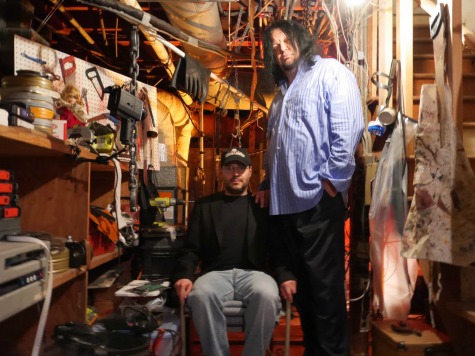
Shortly after Penn Jillette began his first crowdfunding campaign, the money he needed to make his movie more or less fell into his lap.By then it was too late. Jillette, best known as half of the mercurial magic duo Penn & Teller, was hooked on the crowdfunding concept.
Director’s Cut, Jillette’s first stab at the horror genre, is using FundAnything.com to raise the necessary resources. The magician, who wrote the screenplay, initially tried to pitch the film’s concept to different studios. He was told he wasn’t right to play the movie’s villain and that other changes had to be made. So he went the indie route.
The six-foot-six libertarian is following in the smaller footsteps of Adam Carolla, Spike Lee and Zach Braff, but none of those artists have incorporated crowdfunding directly into the finished product.
Put simply, crowdfunding is impacting the movie in ways he couldn’t expect.
“It’s not charity. It’s not investing. It’s this new kind of thing, a new kind of way to be part of something,” he explains. He likens it to being a sports fan, especially those who cry, “We won” when their favorite team is victorious on any given Sunday.
The arts offer a similar experience.
“It’s the great thing about drama … to explore emotions and situations without having them happen to you,” he says.
Director’s Cut is a thoroughly meta movie about a villain (Jillette) offering up his own disturbing commentary on a feature film. Jillette says the movie within a movie concept will also be crowdfunded, and that he’s been revising his original script based on the collective fundraising approach.
The landmark found footage horror film The Blair Witch Project benefited from a Web-based campaign that falsely convinced some audiences the events in the movie actually happened. That impacted the viewing experience and expanded the scope of the film. Something similar is happening with his horror movie, Jillette suggests.
The changes to the movie-making experience don’t stop there.
“Instead of having five bosses [at a studio] we’re gonna end up with 10,000 bosses, and they all want a little piece of us,” he says. That means the FundAnything campaign is offering up a bevy of goodies for those who donate, including allowing contributors to be on the set and study director Adam Rifkin at work.
“I would have sold my car for one of those rewards,” Jillette says of his younger self.
Jillette fell hard for Rifkin’s Look, the 2007 film exploring the impact of security cameras on our lives. That film helped coalesce the themes Jillette was mulling about our smart phone and iPad society.
“My idea is, we’re all making movies, doing mashups,” he says.
Jillette, whose Penn’s Sunday School podcast is part of Carolla’s digital empire, relishes the First Amendment as much as any entertainer. Yet the current trend of comedians getting called to task for saying the “wrong” thing on stage doesn’t frighten him.
“I have a very specific definition of censorship. Censorship must be done by the government or it’s not censorship,” he says. “As much as I disagreed with every second of ‘Fahrenheit 9/11’ the fact that it is out made me jump for joy.”
He suggests comedians take a different approach to their critics beyond scripted apologies, and it involves two words you can’t say in polite company–“fuck you.”
“You don’t like what I said about handicapped people? Fuck you. That will be the answer,” he says.
The outspoken magician says we must learn that the hot-headed trolls on various web sites, or those who try to spark outrage, often don’t reflect their own true views, let alone those of the masses. Ignoring them, or understanding their actual clout in the bigger picture, is imperative as those voices grow louder online.
The free market, he says, should ultimately decide what voices should be amplified or dimmed.
Jillette isn’t bitter about being rebuffed by the Hollywood system. He understands the business side of the ledger and applauds how the machine often works as intended to make populist movies.
“It’s a valid process,” he says. “If I kept pushing, I probably would have been able to get it made with studio money.”
That would have robbed him of full creative control, the chance to play the villain and the spark of having a team of supporters watching him bring something fresh to the horror genre.

COMMENTS
Please let us know if you're having issues with commenting.